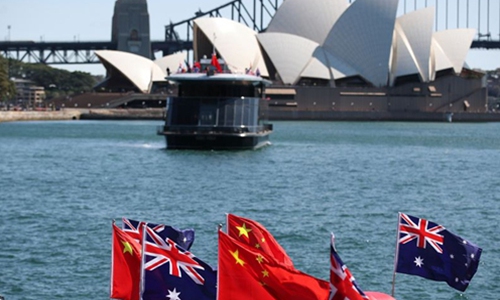Victoria’s BRI deal benefits local economy
By GT staff reporters Source:Global Times Published: 2020/5/25 20:23:40
Partnership is fair and legitimate: Foreign Ministry

Chinese and Australian national flags are seen at an event in Sydney, Australia, September 8, 2019. Photo:Xinhua
Australia's southeastern state of Victoria should stick to its partnership with China to cooperate on the Belt and Road Initiative (BRI), despite noises made by politicians in Canberra, Chinese analysts said.
US Secretary of State Mike Pompeo threatened on Sunday that the Trump administration could "disconnect" with Australia over Victoria's BRI agreement with China.
Victoria is in the final stages of completing the agreement, signed in 2019, but it faces opposition from the Australian Federal government. Australian Home Affairs Minister Peter Dutton Thursday called on Victoria to explain "why it is really the only state in the country that has entered into this agreement."
Chinese experts said that Victoria state has the legitimate rights over its trade policy, and Canberra will lose face if it forces Victoria to revoke the deal. Australia ran a $58.45 billion trade surplus with China in 2019, in addition to lucrative trade in services.
Australian state governments own independent rights to advance economic and trade projects with foreign markets if they do not involve diplomacy and national defense issues, which is prescribed in Australia's constitution, Liu Qing, director of the department for Asia-Pacific security and cooperation at the China Institute of International Studies, told the Global Times Monday.
"The federal government would violate Australia's constitution if it tries to force Victoria to abandon the [BRI deal]."
Pompeo's comments had to be watered down by US Ambassador to Australia Arthur Culvahouse. The US ambassador said the US is not aware that Victoria had engaged in any concrete projects under BRI, and no telecommunications networks project, which falls into the jurisdiction of Australian federal government.
Chinese Foreign Ministry spokesperson Zhao Lijian said Monday that China's BRI cooperation with Victoria is the result of friendly consultations and the partnership is fair and legitimate.
Some Australian politicians' accusations criticizing Victoria's BRI partnership with China are untenable, which only expose their intentions to ignore the interests of the Australian people and will damage China-Australia relations, Zhao noted.
The US diplomatic threats is the largest stumbling block not only in China-Australia political relations, but also in bilateral economic and trade ties, Liu said, noting that the US still hold firm the leash on Australia over investment, national defense and intelligence.
Based on the China-Australia Free Trade Agreement, inked in 2015, the two countries may have signed BRI deal if there has not been political intervention from the US side, Liu said.
"Australia getting embroiled in the China-US crossfire is certainly not good for Australian business," Zhang Jiayuan, an investor with an interest to Australia, told the Global Times Monday.
Han Feng, professor and deputy director-general of the National Institute of International Strategy under the Chinese Academy of Social Sciences, said it would be unhelpful to read too much in the media circus as some foreign media organizations are very biased.
Despite what these politicians said, China will be watching closely what Australia do, Han said.
Victoria's BRI deal with China is a pragmatic practice to drive local growth as the initiative focuses on trade and business cooperation instead of diplomacy and national security, Liu said.
"As far as I'm concerned, not only Victoria, other Australian states are willing to advance cooperation under the BRI after the two countries inked a free trade agreement in 2015," Liu said.
The BRI will bring opportunities to the state in sectors like infrastructure construction, services trade, education and tourism in particular, and farm goods export such as wine, according to a report released by the Victoria government in 2018.
The state eyes bilateral trade in goods with China to reach $11.5 billion by 2026 from 2016's $6.5 billion.
Some Australian organizations, such as the Australia China Business Council, believed West Australia, which has deep ties with China over minerals trade, should also join the BRI.
Posted in: GT VOICE